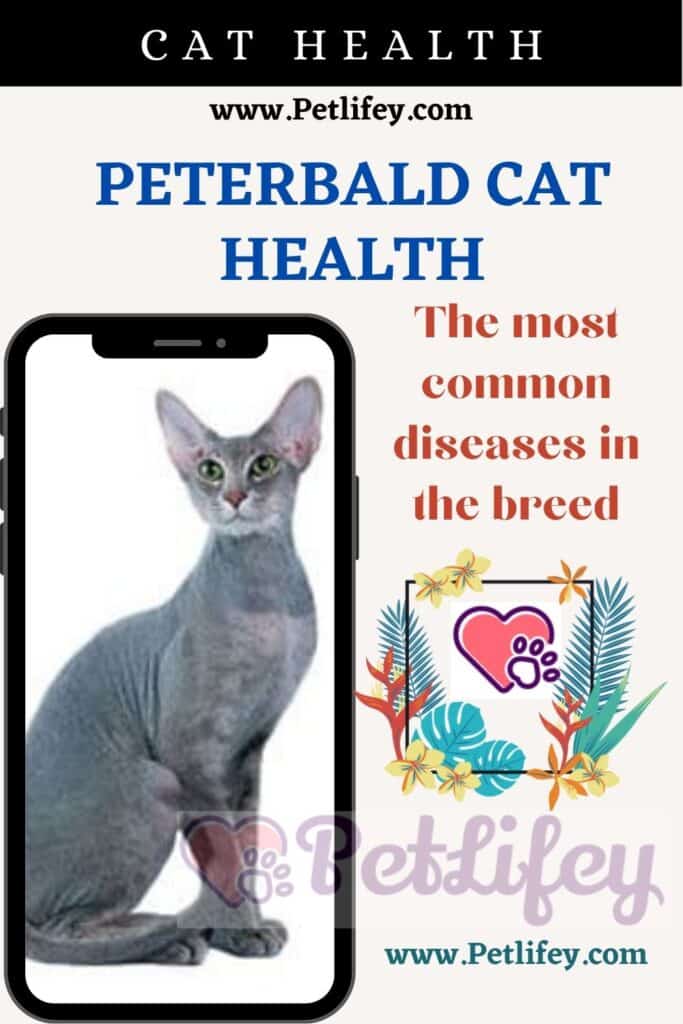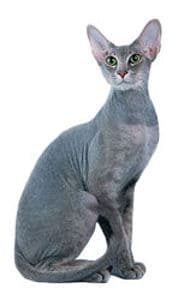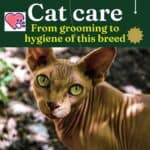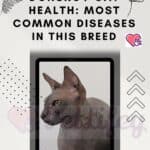Peterbald’s diseases, the most common pathologies in this Russian cat breed . Let’s find out together which ones can hit him.

The Peterbald is a new breed of cats, which is why its history is rather limited.
The breed was first developed in 1994 by a Russian breeder named Olga S. Mironova who crossed an Oriental Shorthair cat with a Don Sphynx cat.
However recent as it is, what is known is enough to say that it is a not very delicate breed but not immune from common diseases in felines.
So let’s find out which are the diseases of the Peterbald, the most frequent in this breed.
Diseases of the Peterbald

The Peterbald is a small to medium sized cat, intelligent, loyal and very affectionate.
The Peterbald is a medium-sized cat whose weight reaches a maximum of 5 kg.
It has a characteristic triangular head, large and pointed ears, a long muzzle, oblique eyes and a particular hair on the body that even allows the skin to be glimpsed.
Many Peterbald cats are hairless, so the main concerns are: sunburn, sensitivity to heat and cold, and other skin problems.
Their delicate and exposed skin can also be easily injured, even just playing with another cat or perhaps with children.
The Peterbald breed tends to enjoy good health apart from some specific pathologies, such as:
- progressive retinal atrophy: an inherited disease that leads to blindness. This disease can manifest itself in the adult age of the cat but also at a young age, with the difference that an adult and mature cat is better able to adapt to its new life as a blind person, while the kitten has little time to progressively prepare for its new life as a blind person.
- obesity and diabetes: despite the Peterbald’s dry and hyperactive body, if not carefully controlled and following a suitable diet, he can find himself in a critical situation regarding obesity in cats. This breed needs daily physical exercise and it is essential to provide them with various toys that allow them to exercise (for example: scratching posts for cats and high shelves to climb).
Some Peterbald specimens can suffer from the same diseases as domestic cats , i.e. mouth diseases, for example:
- gingivitis : an inflammation of the cat’s gums caused by tartar. The obvious symptoms will be: bleeding, itching, redness and inflammation of the part. The animal must absolutely be treated, generally with antibiotics;
- periodontitis : this is an infection that reaches the teeth, generating pus that comes out of the gums and that could be ingested by the feline. This substance will in fact affect various internal organs, such as the kidneys, liver and even the heart.
- dental resorption : this condition prevents the cat from eating properly and drooling frequently, because the part that covers the tooth is completely worn out. In these cases the veterinarian could prescribe some antibiotics or resolve with dental extraction;
- feline stomatitis : inflammation of the mucous membrane of the mouth due to the presence of bacteria. Symptoms are: redness, excessive salivation and tissue irritation;
- tartar : Bacteria that attach to food debris and more, form dental plaque, which can worsen and become tartar. Correct oral hygiene and the use of specific objects and snacks for the teeth will suffice to avoid the problem;
- absorption of the enamel : the enamel tends to detach and the cat to swallow it. The teeth will look different than usual, with a tendency to have red spots on the tissues.
- carcinoma : is the tumor of the mucous membranes of the mouth. It presents with growths, ulcers and peeling of the tissues. A rather serious conduction where it is possible to try with radiotherapy.
Skin diseases
The Peterbald being a naked or partially naked cat, for this reason it is particularly predisposed to some pathologies that affect the skin, such as:
- dermatitis in cats, due to an accumulation of sebum caused by the absence of the coat;
- urticaria pigmentosa: a rare dermatological disease, the most common form of mastocytosis. A tumor, almost always benign, characterized by the abnormal growth and accumulation of a particular type of cell that is produced by the hematopoietic system;
- otitis and other ear diseases in cats, caused by the accumulation of earwax
- sunburn
- skin tumors
It is therefore essential to take care of the hygiene of the Peterbald very well, making sure to regularly clean eyes, ears and skin. In this article we see in detail how to take care of the Peterbald.
Other diseases common in all breeds
Of course, like other felines, the Peterbald can suffer from diseases common in all cats which can be:
- FeLV : known as feline leukemia, it affects the bone marrow and is caused by a virus of the Retrovirus family, among which there is also the one responsible for FIV itself;
- FIV: a is a feline immunodeficiency syndrome similar to human HIV, transmissible through saliva and blood. It is not curable and there is no vaccine but, if intercepted in time, it can sometimes allow a considerable survival;
- Cold : it is a light respiratory disease but which in any case must be treated to avoid complications and also be attacked by secondary diseases of the respiratory tract;
- Abscess: infection due to deep wounds, we can see them on the paws, behind the tail or on the muzzle of the animal. Treatable with antibiotics;
- Poisoning;
- Feline conjunctivitis : inflammation of the mucous membranes of the eye;
- Mange: It is caused by a mite of which there are different species and subspecies that behave in different ways. It is transmissible to other animals and to humans, there are several types and has symptoms similar to eczema: itching, scabs, patchy hair loss. This disease is also called scabies;
- Toxoplasmosis: an infectious disease caused by the parasite Toxoplasma gondii, which finds its final host in the feline where it can reproduce.






